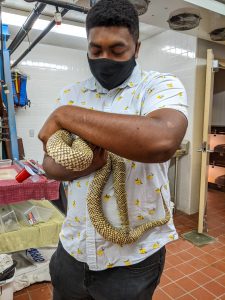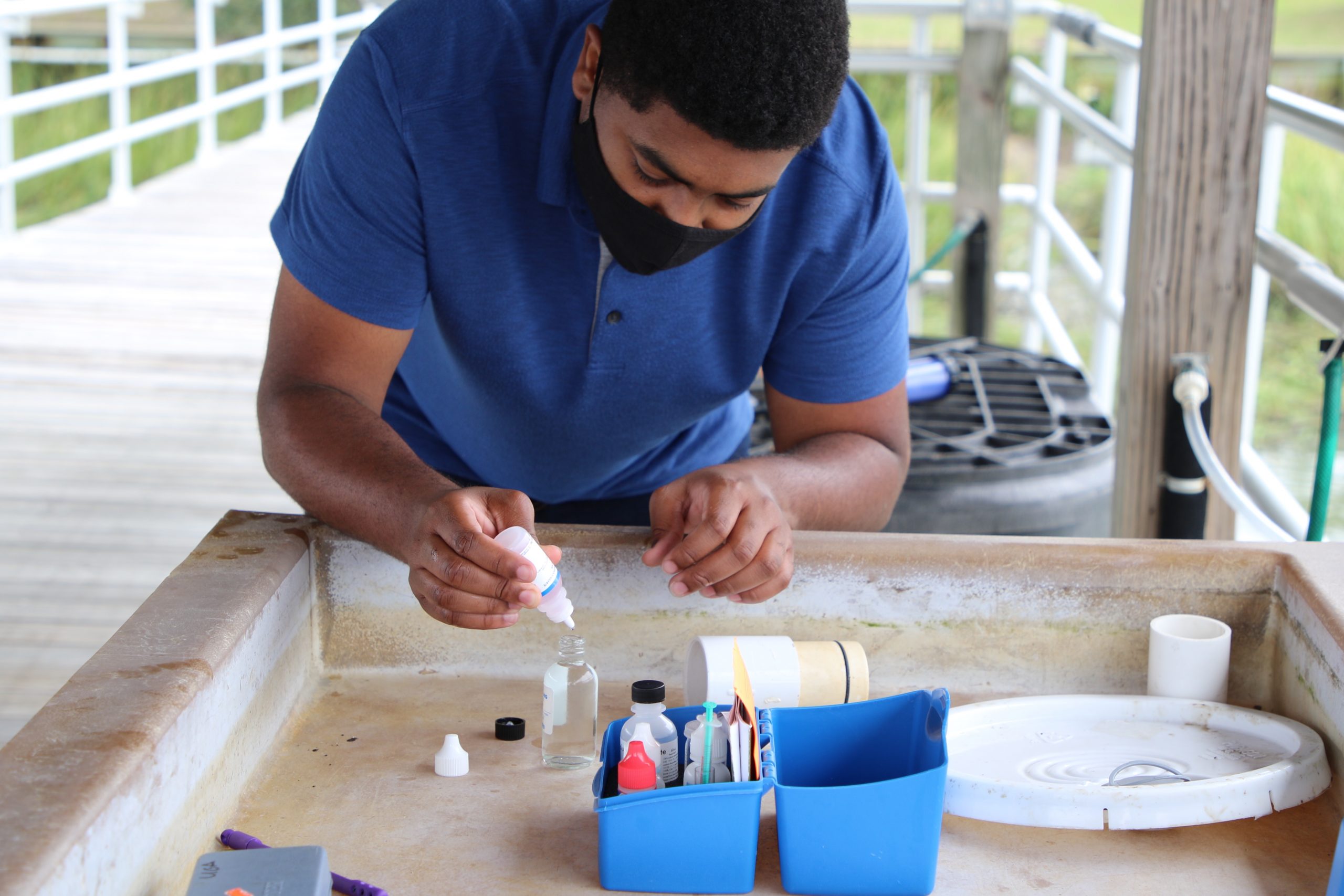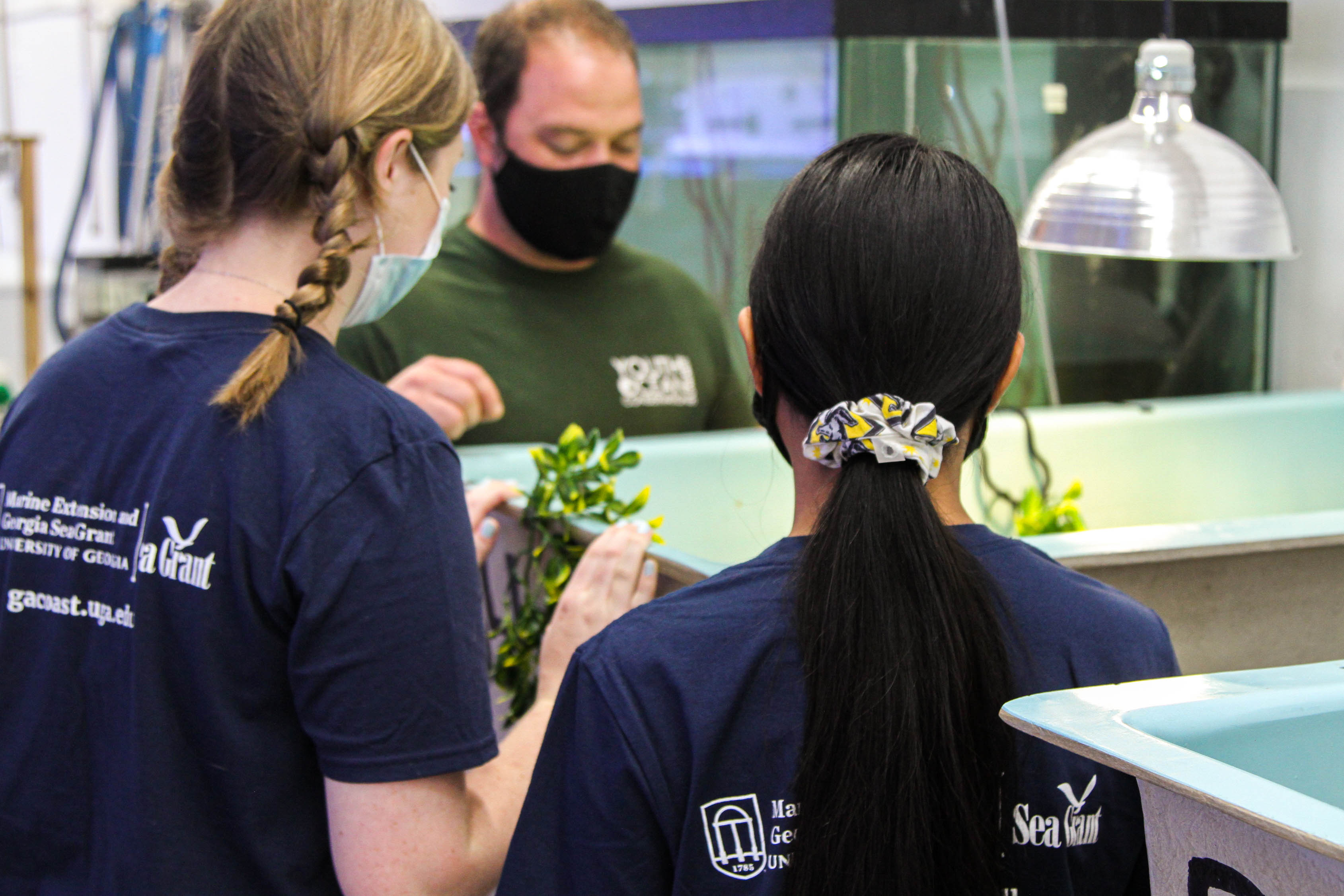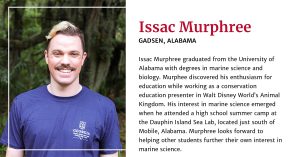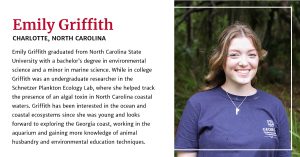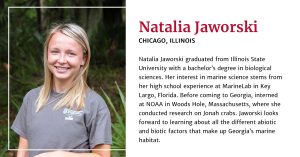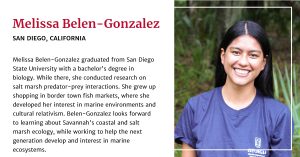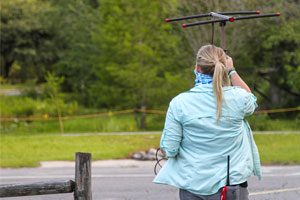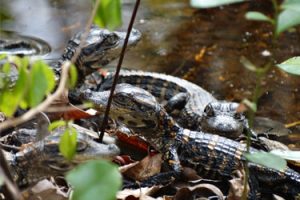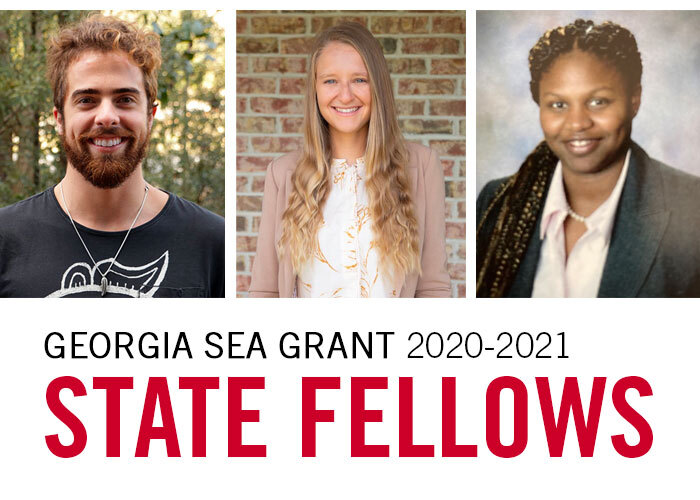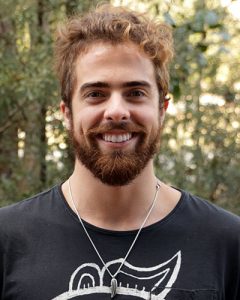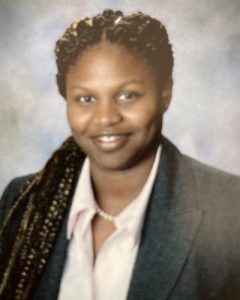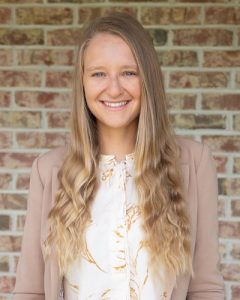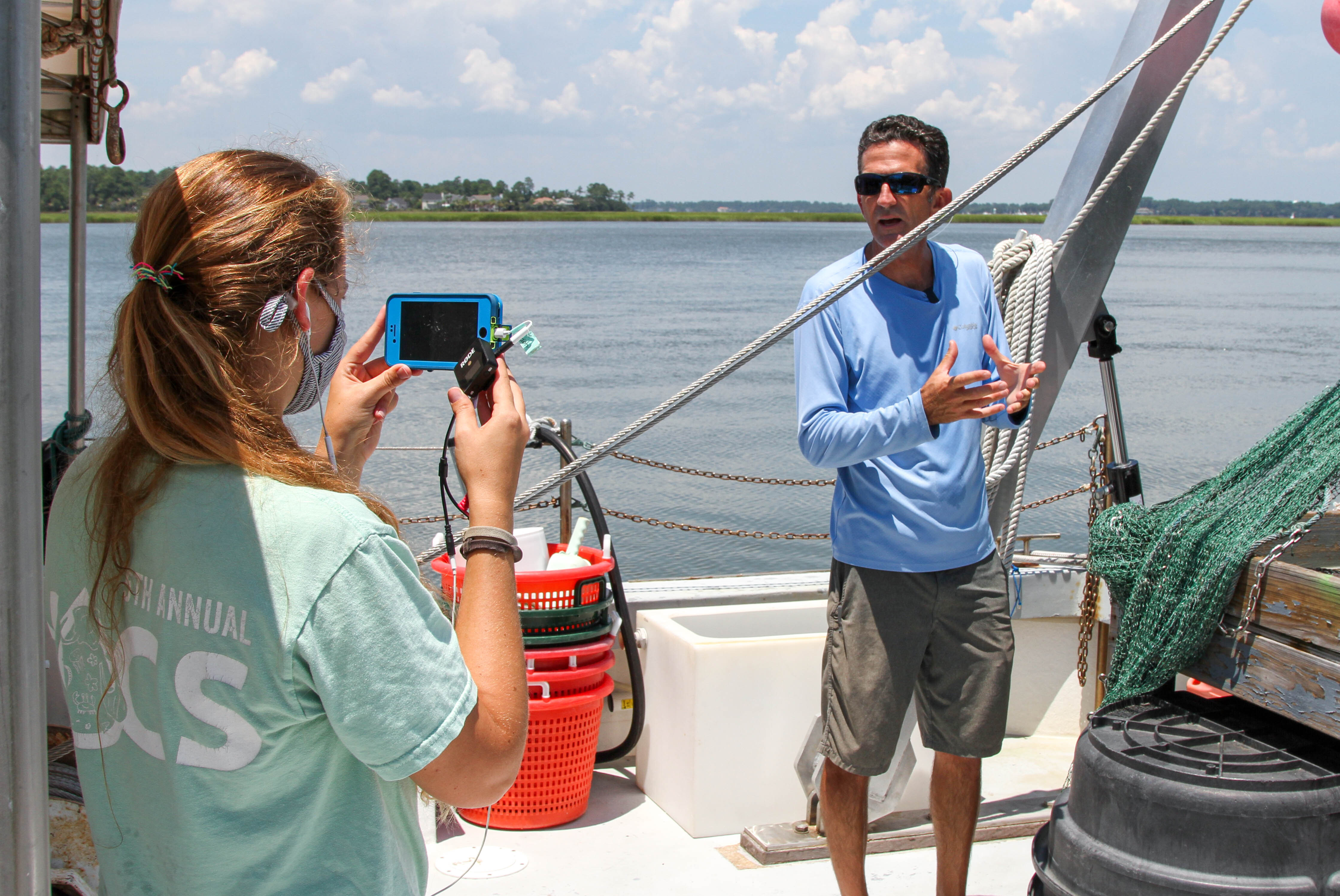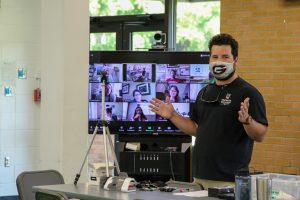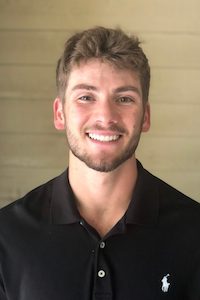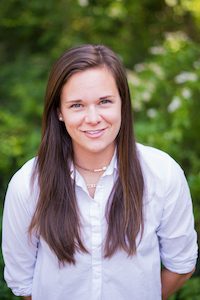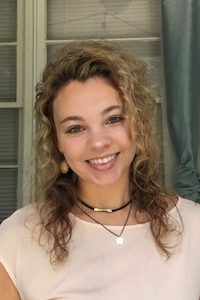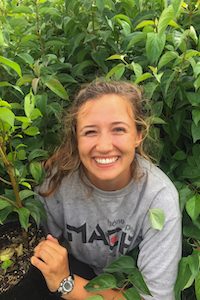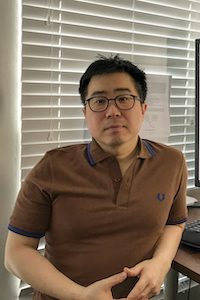On the deck of the Sea Dawg, Marine Extension and Georgia Sea Grant’s 43-foot research vessel, Marine Educator Dodie Sanders sets up her computer, webcam and teaching props, which include live fish, corals and a stingray.
She introduces herself through her webcam and asks her first question, “What do we call water that’s in between fresh and salty?”
“Brackish!” responds a chorus of students from the speakers of her computer.
A few hundred miles away in Rome, Georgia, 25 fifth graders at the Darlington School are watching Sanders’ program on their iPads. Typically, this conversation would happen aboard the Sea Dawg while trawling for live specimens in Wassaw Sound. For the next two days, educators at UGA Marine Extension and Georgia Sea Grant’s Marine Education Center and Aquarium are bringing the on-site, outdoor experiences to the classroom for the first time by way of virtual school trips.
Sanders describes the importance of Georgia’s brackish water estuaries where so many different species, like red drum, shrimp and blue crabs spend all or part of their lives. She talks about the different animals in her touch tank, explaining the physical and biological characteristics that are unique to each animal.
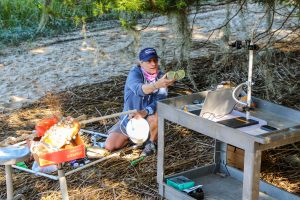
Sanders uses a computer and webcam to virtually teach students.
The educational trawl is just one of 16 different virtual classes now available to K-12 classrooms across the state. Available classes include marine debris, squid dissection, maritime forest hikes and more.
“Shifting from on-site to virtual programs has made us approach everything we do from a very different perspective with the goal of creating meaningful and impactful education programs,” says Sanders, who, along with her marine educator colleagues, spent several months modifying on-site programs for a virtual setting.
“How do you virtually capture searching for invertebrates living on the underside of a floating dock, the smell of salt marsh mud, hiking across an undeveloped barrier island, or touching cool organisms collected in a trawl net?” Sanders asks. “We’re incorporating the same teaching methods, the same tricks of the trade but perhaps on a more complicated and elevated level.”
The education team developed program templates, wrote teaching outlines, created new pre- and post-activities and tested new audio-visual equipment to prepare for the virtual school programs.
They keep the students engaged by showing pre-recorded videos of local environments and up-close live shots of animals that are native to the coast.
They also frequently pause instruction for question and answer sessions and encourage opportunities for students to share their own stories.
“Do you ever not want to go trawling and just sit on the boat instead?” asks one student during the virtual trawl.
“What happens if you catch a shark?” asks another.
Julie Fine, a fifth-grade teacher at Darlington School, says students at Darlington have been visiting the education facility on Skidaway Island for 10 years.
“We were really concerned that our kids would be missing out on a lot of the things that make fifth grade special. So much has already changed in their world,” says Fine. “When we reached out to see what you guys might be able to offer, we were really excited to hear about the virtual experience.”
Fine and fellow fifth grade teacher Bebe Cline chose the classes they would normally have done on-site, like the squid dissection and dolphin excursion, but they also picked new classes, like the trawling trip and coastal reptiles, which ended up being big hits with their students.
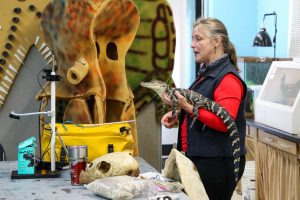
Through virtual programming, students can experience live animals such as this alligator held by Marine Educator Katie Higgins.
“At one point, one of the fish jumped out of the little tray and they loved that. They loved seeing them up close,” Fine says.
Their goal was to make the two days as full and as exciting as possible, without actually being at the coast, Fine says. They also chose topics that aligned with their studies of classification and coastal Georgia as part of the fifth-grade curriculum.
“Our students were definitely focused and learning and really getting the material, much the same that they do while they are actually there,” Fine says.
This positive feedback from Darlington is encouraging for educators at the Marine Education Center and Aquarium, who plan to further enhance virtual school programming and reach more students in the coming year.
In the past, transportation, funding and logistics have often made field trips a challenge for schools who want to come to the Marine Education Center and Aquarium.
With the virtual programs up-and-running, teachers can bring the coast to their students with the click of a mouse and at a fraction of the cost.
“Our new world of teaching virtually affords the opportunity to reach and serve more diverse communities, especially those who may not be able to take part in our on-site programs,” says Sanders. “Virtual programs make us more accessible.”
Teachers can learn about and register for Marine Extension and Georgia Sea Grant’s virtual school programs at https://gacoast.uga.edu/virtual-school-programs/
